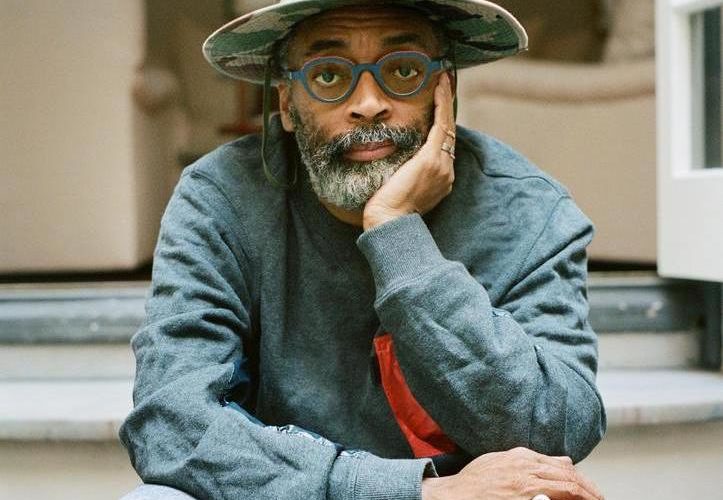In terms of entertainment, fantasy and frivolity feels wrong; we want and need to see truth — even if it’s uncomfortable — and characters that reflect the complexities of life. It’s this desire that makes the release of Spike Lee’s Da 5 Bloods on Netflix not just timely, but prophetic-feeling.
Lee, however, is simply doing what he’s always done: exploring racial and class disparities with unflinching realness and nuance, but also charisma and soul. Three decades in, the filmmaker has earned respect, awards and legend status, but he hasn’t forgotten his days of being stereotyped as a troublemaker.
“I was pilloried as the angry black man,” he tells the Weekly by phone from his Brooklyn office, the day before Da 5 Bloods premieres on Netflix. “And as the angry black filmmaker who by showing and playing the character Mookie and throwing a garbage can through a famous pizzeria, was inciting black people to riot all across America. [They’d say], ‘When this happens, blood is gonna be on Spike’s hands!’ and ‘With this film Spike Lee is putting dynamite under every seat in America!’ and ‘Pray to god that this film doesn’t open in a city near you’.”
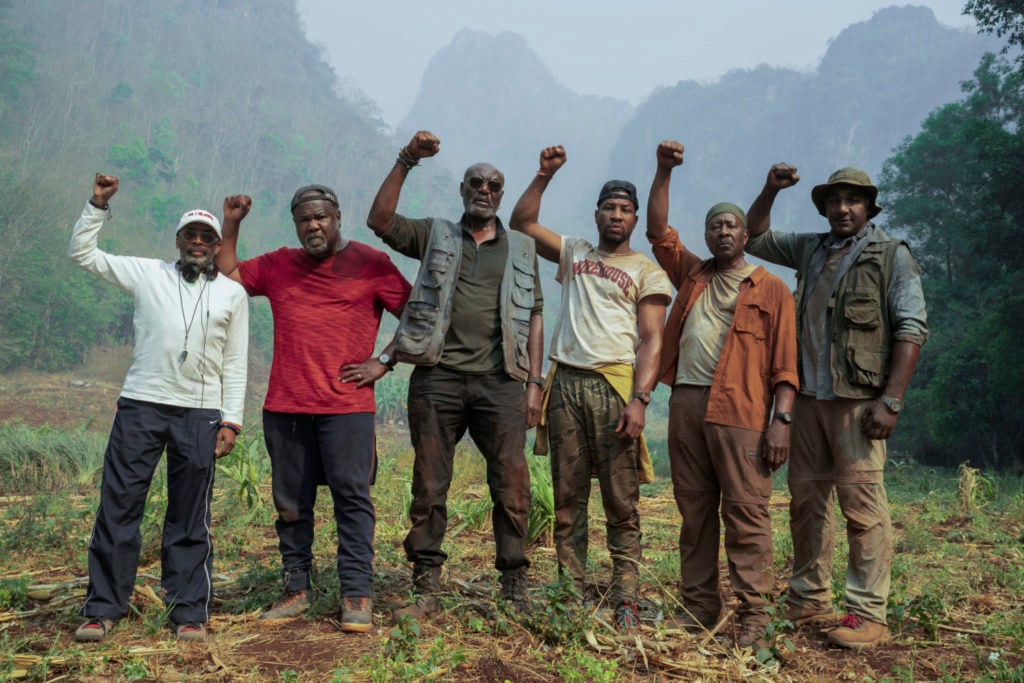
(L to R) Director Spike Lee, Isiah Whitlock Jr., Delroy Lindo, Jonathan Majors, Clarke Peters and Norm Lewis in DA 5 BLOODS (DAVID LEE/NETFLIX © 2020)
Lee is of course referring to the critical judgments spewed his way back in 1989 when Do The Right Thing, his third feature and best known work, first came out. The film, which depicted racial tension in New York to the soundtrack of Public Enemy’s compelling anthem “Fight the Power,” climaxes tragically when a central black character, the boombox-toting Radio Raheem, is murdered by a white cop. Though the movie was undeniably vibrant and engaging, it was also caustic in its depiction of the anger between races — so much so that, even though it was lauded and Oscar-nominated, some people still couldn’t handle it.
Lee would go on to make a multitude of less incendiary, great films (Jungle Fever, Mo’ Better Blues, Crooklyn, Summer of Sam, to name a handful), but his focus on the inequitable nature of society and the black point of view often saw him unfairly pigeonholed. Even if you think of his body of work as somewhat hit or miss, the hits have always offered unforgettable blows that sought to open minds and defy expectations. And they’ve all maintained the signature Spike Lee–style and swagger.
This is definitely the case in Bloods. The tale of Vietnam vets, who return to the land where they fought as American soldiers decades prior, to retrieve a fallen soldier’s body (and hidden treasure) works with a very simple narrative. Which is probably for the best. The riveting performances by Delroy Lindo as the MAGA-hat wearing Paul, Jonathan Majors as his son David, Norm Lewis as Eddie, Isiah Whitlock Jr. as Melvin, and Clarke Peters as Otis are front and center. Lee’s immersive editing and flawless score don’t compete either — they complement, so that the viewer takes it all in.
Of course, there’s a bigger subtext here, and it’s not meant to be subtle. Spike joints — what he calls all his projects — rarely are. More than maybe any other movie he’s ever made, including Malcolm X and Black KKKlansman, the power in this new film lies in its authentic reflection. The all-in approach aims to show how history repeats itself, and how most of us never understood the full scope of how much it does so because we never got the full picture to begin with. History, Lee says, is not taught in an inclusive or even honest way, and that is part of the problem.
“The education system of the United States of America has been delinquent in how history is taught, in what is left in and what is left out,” he asserts. So I’ve been in that battle as far as how it goes from the get-go. My first film at NYU, called The Answer, was about D.W. Griffith’s Birth of a Nation. So I’ve been fighting against the false narrative, and false history, the lies that the powers that be have put out about this country for a long time.”
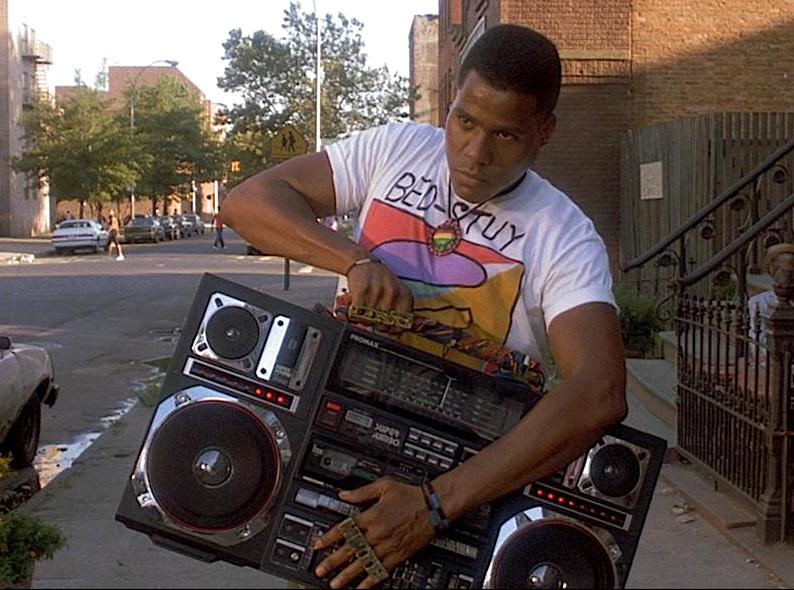
Bill Nunn as Radio Raheem in DO THE RIGHT THING (Universal Pictures)
Lee adds that in most interviews regarding Da 5 Bloods he makes it a point to ask journalists if they were writing down names they didn’t know during the film and googling them afterward. “I’m not faulting you or anyone else if you don’t know them all, because it was never taught,” he explains. “That’s the whole point of this film, that black folks — and I’m reciting words from the film — ‘Even dying…we built this bitch’…. And that’s what I want people to know. The first person to die for the United States of America in the an American war was a black man [Crispus Attucks, one of five men who died in the Boston Massacre of March 5, 1770]. So I don’t ever want to hear from some people, especially ‘Agent Orange’ and the White House, that black people are not patriotic.”
It’s been reported that Lee will not say the name Donald Trump in interviews anymore, so he uses the name of the powerful herbicide used by U.S. military forces during the Vietnam War instead. It’s fitting considering the film’s subject matter and 45’s much noted spray tan hue. And it’s easy to see why Lee decided to explore the Vietnam War for his latest project, especially after watching it. The parallels between past and present are numerous, and not just the protest aspect (which the viewer must remind themself was written, conceived and filmed way before the current wave of demonstration and fight for change).
“I don’t think one has to work very hard to make a connection between the black and brown soldiers being sent to the front lines and the situation with this pandemic,” Lee points out, adding that his own perspective on the war was formative as well. “I was born in 1957 and you do the math — I was 10 years old in ’67. Old enough to know what’s going on but young enough not to be drafted, and the Vietnam war was the first war that was televised into American homes. So I remember this stuff as a kid. It was on TV, it was discussed at the dinner table. I was seeing it. And what happened in the ’60s has not happened until today, where there was a revolution, where you had the black power movement, the anti-war movement, the women’s movement, all the people came together. “
As producer, co-writer, director and artistic director of Da 5 Bloods, Lee sought to use everything in his toolbox to tell the story, including the melding of real footage to strengthen his character’s points. From the opening montage which features everyone from Muhammad Ali to Angela Davis, to later scenes, which flash back and forth between the war and the crew’s new journey, it all feels seamless. Not any filmmaker could pull off the multifaceted mix of messaging and emotion seen here and still make it entertaining like Lee does.
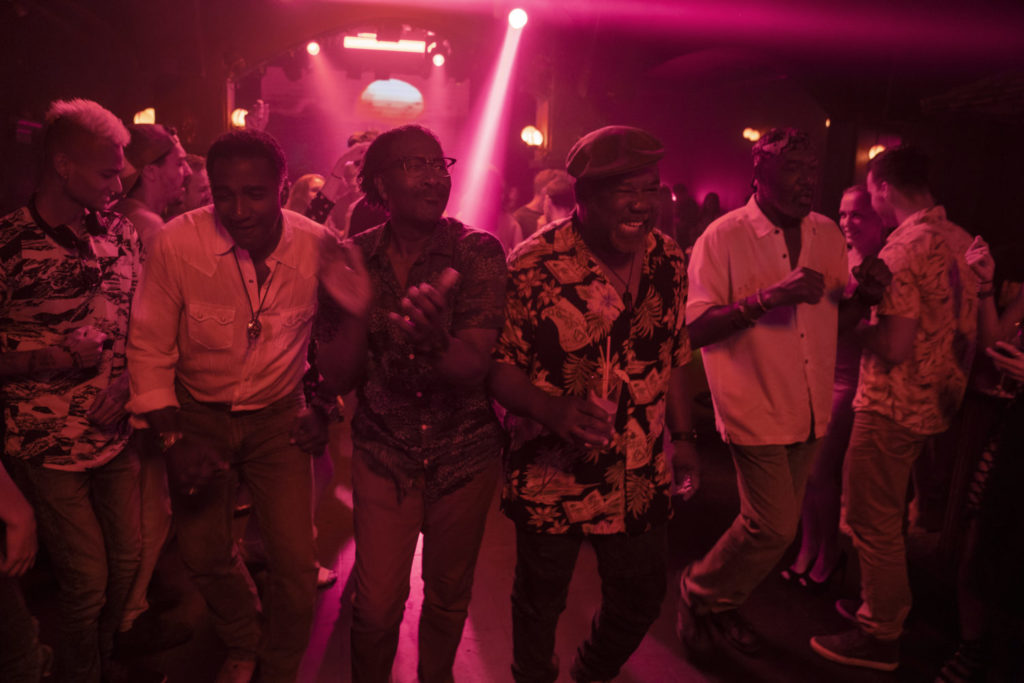
(L to R) Norm Lewis, Clarke Peters, Isiah Whitlock Jr. and Delroy Lindo as PAUL in DA 5 BLOODS. (DAVID LEE/NETFLIX © 2020)
According to Peters, who plays the least damaged of the Bloods and obvious moral compass of the film — Otis — Lee’s intention and focus is one of his greatest gifts. “His method is very much like in theater, where you have round table talks and breaking down of character and storyline, which very few directors spend time doing,” Peters tells us on a call from the UK, where he lives. “That frees us up so that we can go away from those discussions and work on whatever it is that we need to work on. So that when we get on set, we have all been doing our homework. And what I know on Spike’s set is that no one is going to be wasting time. He knows what he wants and he is expecting you to be on your best game…that’s a really enlightening and lovely place to be.”
“At NYU Film, where I graduated, I finished in ’82… Ernest Dickenson and Ang Lee were my classmates and we were all a few years behind Jim Jarmusch, who was our hero,” Lee, who is now a tenured professor at the school, recalls of his early years and influences’ impact on his current work. “What I wanted to do with this film, and we started doing this a bit with Black KKKlansman (where at the end we go to Charlottesville) was use more archival footage and archival still photographs. I’ve done documentary films too and I feel very comfortable doing both, and so I had those skills in documentary forms and with this joint I put more of that stuff than I ever have into a narrative film.”
At 63 years old, Spike Lee has honed his visceral style and maintained the enthusiasm of his younger years, too. During our interview he raises his voice and speaks faster when he’s talking about something that excites him, and his zeal is contagious. Considering what is going on in the world right now, he has a reason to be roused. Is everybody finally getting what he’s been trying to say all these years? Black folks always understood, but have white people finally, truly had their eyes opened beyond performative wokeness?
Before George Floyd and the heartbreaking video that captured his death at the hands of Minneapolis police went viral, the problem was there, but it was easy to push away for many of us not living it. But Lee has been addressing these problematic realities since Do The Right Thing, and last year he sought to revisit it with a new short film that drew parallels to today. Little did he know it would do that and more.
“I made the short film 3 Brothers about the death of Eric Garner, where I cut the video of him, going back and forth between the fictional death of Ray Raheem — which is based on the real life chokehold death by NY City transit cops of the graffiti artist Michael Stewart,” he explains. “So when I saw my brother King George Floyd and that footage, I said we got to do this again and add him to it.”
The short was premiered on CNN during a town hall special and sought to show that “to police forces it looks like black lives don’t matter,” Lee says. “It’s a problem that the world saw. That’s not to say that the U.S. is the only place that has racists, but that image that the world saw of the last eight minutes and few seconds of his life, that went around the world and that hit people’s hearts around the world. And that shows you the power of visuals.”
Lee goes on to share a bit more about Raheem. In addition to Stewart, the character was a homage to Robert Mitchum in the classic The Night of the Hunter directed by Charles Laughton. Mitchum had “love” and “hate” tattooed on his fingers and Raheem rocked the same words as gold knuckle rings, which Lee himself wore when he picked up his Oscar for Black KKKlansman. “It’s all about love,” he expresses. “People in the streets, saying ‘Black Lives Matter’ are being very vocal and saying this bullshit of hate has to stop.”
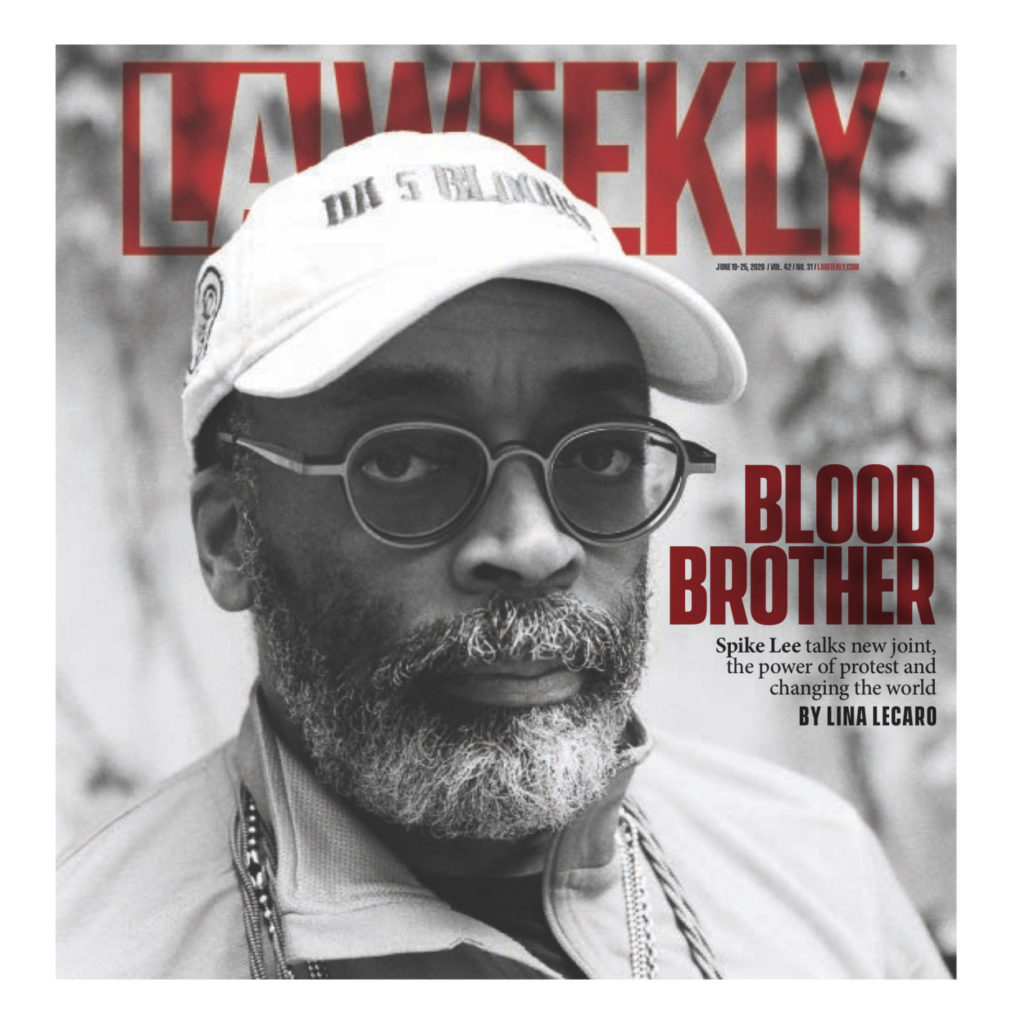
This week’s L.A. Weekly cover story. (Photo courtesy Satchel Lee/Netflix)
His Netflix film (which was meant to debut at the Cannes Film Festival then have a theatrical release before hitting the streaming service) has been called timely, and it is, but it always was. The world has changed and one might argue that having the film come into all of our homes right now made it timelier than it could ever be otherwise. The struggles Lee has highlighted recently are not new to him or African Americans in general, and that’s the point. Still, he does acknowledge that we are all viewing his current work through new, more loving lens.
“I think that anyone that has a conscious mind and their hearts open can connect what’s in Da 5 Bloods and what is driving people to go to the streets and demonstrate all over the world,” the filmmaker says as we wind down our interview. Before he says goodbye, Lee shares that he’s been riding his bike in a mask and gloves throughout New York to check out and join in protests, and it has clearly inspired him and given him hope to see people finally doing the right thing.
“It makes my heart feel good when I see non-black people and non-brown people, in the streets yelling and screaming and chanting peacefully, ‘Black Lives Matter.’ That is something new. That is something different. These demonstrations are acts of love and the repudiation of hate. Period.”
Da 5 Bloods is now streaming on Netflix.
Advertising disclosure: We may receive compensation for some of the links in our stories. Thank you for supporting Irvine Weekly and our advertisers.

